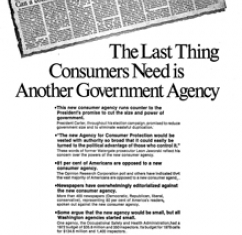
By Tim Fernholz. The American Prospect. September 9, 2009.
I've got a story today on how the Chamber of Commerce and other business interests are trying to kill the proposed Consumer Financial Protection Agency with 'death panel' tactics -- exaggerating the affects of the legislation and making it seem as though it would harm ordinary Americans. But these kinds of moves aren't unusual. In the 1970s, there was momentum toward creating a Consumer Protection Agency that would act, essentially, as a kind of clearinghouse for consumer complaints, rather than an actual regulator with enforcement powers. But as Lawrence Glickman chronicles, its opponents also reacted with outrageous rhetoric:
"Although the proposed agency was relatively modest with an initial budget of $15 million/year, opponents depicted it as exemplifying a new and dangerous bureaucracy favored by overzealous liberals. According to critics, the authorization of a consumer protection agency would result in 'big government,' a symptom of which was 'red tape and lawyers,' as well as 'onerous' and 'mind-numbing' regulations. The CPA bill would lead to 'immense harassment of employers,' concluded the Nation’s Business, published by the U.S. Chamber of Commerce.
But the opponents went further than merely condemning the excessive paperwork the CPA might generate. It represented a 'bureaucratic nightmare,' according to James J. Kilpatrick who was one of many syndicated columnists–among them, Patrick Buchanan, William F. Buckley and George Will – to criticize the CPA in his columns, because the CPA was authorized with inappropriate and excessive powers, which would turn it into a 'meddlesome' and 'out of control' body, a 'superagency,' even a 'monster superagency.' Critics agreed that the CPA would hold what they variously framed as 'irresponsible power,' 'unbridled power,' 'absolute power,' and 'enormous power.' The CPA would produce a group of potentially 'despotic' and dangerous 'super snoops.' According to the US Chamber of Commerce, the CPA bill marked 'the most serious threat to free enterprise and orderly government ever to be proposed in Congress.'"
Just as health care 'death panels' remind us of Ronald Reagan's apocalyptic, and ultimately wrong, predictions about Medicare, the exaggerations promoted by the business community around consumer regulation are the same tired rhetoric that has been used since the 1970s. (The picture above is an ad [PDF] the Chamber ran in the New York Times in 1977 opposing the CPA.) But the the events of the last 30 years, and especially the last decade, provide a strong empirical case for real consumer protection that would increase choice and access to credit.
Originally published in the American Prospect, on September 9, 2009.


Add new comment